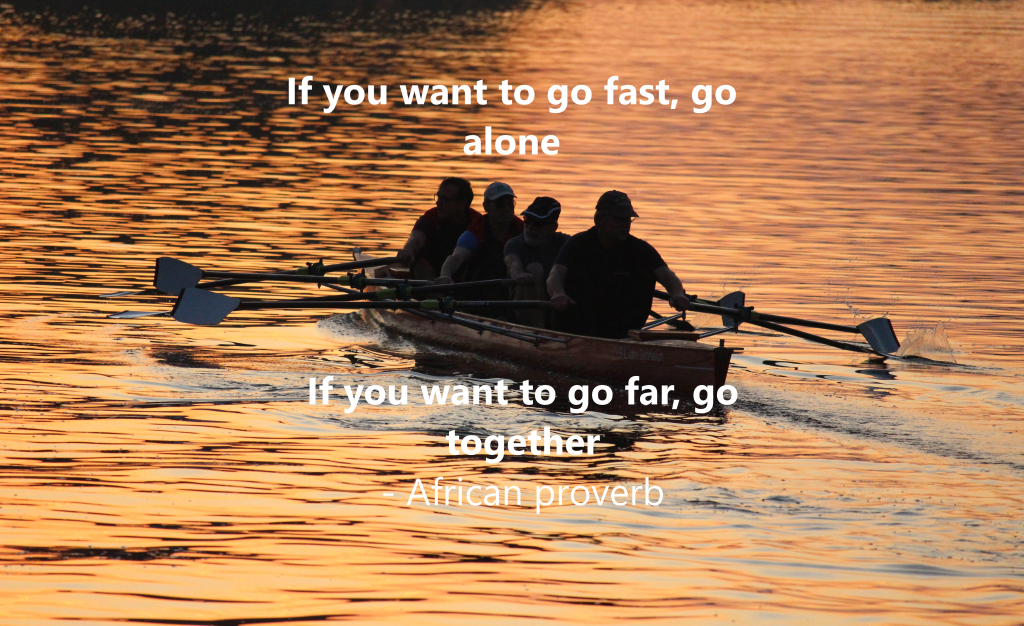Section audio
“Go far” by Brad C. Anderson, Developing organizational and managerial wisdom, Kwantlen Polytechnic University is licensed under CC BY 4.0 / A derivative from the original work.
Organizational action is a group activity. Thus, to develop organizational wisdom, organizations must create teams capable of acting wisely. Several criteria will allow teams to achieve this.[1][2] These include:
- Clearly defining the team’s scope.
- Providing the team with resources needed to do its job
- Creating interdependence between team members
- Ensuring team membership is stable.
- Recruiting team members with relevant skills
- Ensuring the team has adequate authority in the organization to do what it set out to do
- Creating effective norms of communication and openness
- Shielding the team from external political turmoil so it can focus on its job.
These elements are discussed in more detail below.
Defined scope
Leaders must identify the team’s scope of activities. Leaders must identify expectations, project boundaries, available resources, and the duration of activities to do this.
In many organizations, a team may have multiple projects on which it works. In these situations, managers must identify how the team will prioritize numerous deliverables.
Adequate resources
Leaders need to ensure teams have the required resources to do their job. These resources may include (but are not limited to):
- Information (this point is vital, yet easy to forget)
- Budget
- Personnel
- Equipment
- Time
These resources are linked to the team’s scope of activity. If a team’s resources are insufficient to fulfil its scope, leaders must modify the scope or provide more resources.
Creating interdependence
The team must be interdependent. Individuals within the group can only achieve success if they collaborate with the other team members. Organizations can accomplish this by creating teams where members share responsibility and focus on delivering the same outcome.
Stable membership
Teams need to have stable membership. Once a person is in a team, they are in it for the long haul.
This creates continuity of knowledge, experience, and action, which allows the team to maximize efficiency. It also allows individuals to learn how to work effectively together. It also increases the commitment individuals have to the team’s goals.
Thus, leaders need to avoid cycling people in and out of the group.
Needed skills
Every member of the team must have a role. When creating teams, leaders should select members with requisite skills.
In addition to skills, though, members of a capable team should also possess self-awareness of their strengths and weaknesses. They need to have strong communication skills. In short, select team members with strong social and emotional intelligence.
Adequate authority
Importantly, the team members need to have the authority to take the necessary actions to achieve success. If the purpose of a team is, for example, to implement a new IT system across many departments, then that team must be comprised of members with authority to modify the processes of those departments.
Create effective norms
Effective teams create norms of openly discussing issues, such as competing priorities, disagreements, and so on.
Shield teams from political turmoil
For best results, when teams are working on innovative solutions to difficult challenges, managers need to shield their team from political turmoil within the organization.
Key Takeaways
- Effective teams
- Have a clear scope
- Have clear priorities
- Have access to the information they need to do their job
- Are interdependent
- Have stable membership
- Have roles for every member
- Have members chosen for skills and self-awareness.
- Members should possess the authority to take the actions needed for the team to succeed.
- Create norms of openly discussing issues
- Are shielded from the organization’s political turmoil
- Nielsen, T. M., Edmondson, A. C., & Sundstrom, E. (2007). Interpersonal Logic--Team Wisdom: Definition, Dynamics, and Applications. In E. H. Kessler & J. R. Bailey (Eds.), Handbook of Organizational and Managerial Wisdom (pp. 21–42). Thousand Oaks, CA: Sage Publications Inc. ↵
- Anderson, B. C. (2019). Values, Rationality, and Power: Developing Organizational Wisdom--A Case Study of a Canadian Healthcare Authority. Bingley, United Kingdom: Emerald Group Publishing Limited. ↵
The awareness of your emotions and those of others combined with the ability to manage these emotions constructively.


